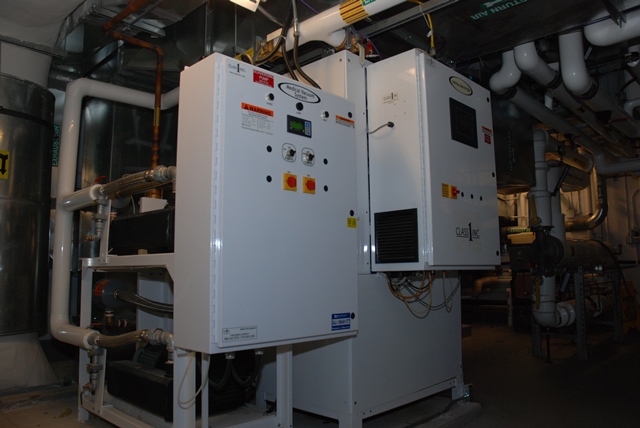New patented technology developed in Waterloo Region will help battle climate change by capturing anesthetic gases that cause global warming.
Grand River Hospital (GRH) has activated its halogenated drug recovery (HDR) system, developed by Class 1 Inc. of Cambridge. The technology captures waste anesthetic gases exhaled by patients undergoing surgery. The gases are liquefied and stored for future re-processing.
GRH’s KW Campus has been the pilot site for the system. Exhaled air from surgical patients is now diverted into specialized equipment in a mechanical room. The anesthetic gases are captured and stored in canisters rather than being released into the environment. The canisters are replaced regularly.
“Just a single 240 mL bottle of anesthetic gas released into the atmosphere is the equivalent of 1.4 tonnes of carbon dioxide emissions. Our system safely captures and stores these gases without releasing them into the environment,” says Barry Hunt, president and CEO of Class 1 Inc.
MORE: ENVIRONMENTALLY RESPONSIBLE HEALTHCARE
“Our operating rooms support 7,600 surgical cases with general anesthetic every year, and use 854 bottles of anesthetic gases. Class 1’s HDR system will reduce our carbon footprint by more than a thousand tonnes a year,” says Malcolm Maxwell, GRH president and CEO. “HDR is among several technologies we’re using to reduce greenhouse gas emissions at GRH. Automating our building heating systems has reduced energy use and related emissions while saving funds that we can redirect to patient care services.”
Class 1 Inc. worked closely with the University of Waterloo’s chemical engineering department to develop the system over the past seven years. The company is now bringing the technology to market, and has installations planned in more than a dozen hospitals across North America.
“This is an ideal research partnership with Class 1 Inc., that really makes an environmental difference, and with Grand River Hospital who allowed us to prove the process,” says Bill Anderson, professor of chemical engineering, University of Waterloo. “Midsize hospitals can emit the carbon equivalent of up to 1,200 automobiles annually. HDR will eliminate that.
The system’s estimated price is $300 per operating room per month.


